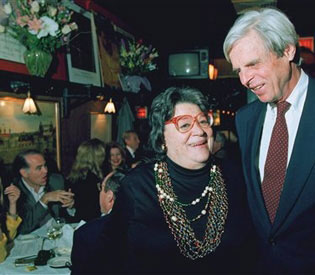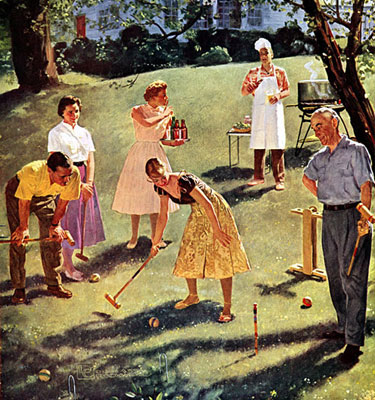 Gay Talese, one of the gods in my personal pantheon of iconic writers, once said that restaurants are a great escape for him.
Gay Talese, one of the gods in my personal pantheon of iconic writers, once said that restaurants are a great escape for him.
They are for me, and for many New Yorkers.
The right restaurant, not too fussy or trendy, with a big bar for
chatting, eating, drowning the thoughts of the day and sparking the
thoughts of the night, is one of the reasons why I love this city and
have since I moved here 15 years ago.
Elaine's was that kind of place. Is that kind of place, I guess,
although I can't imagine being there without the possibility of a
sighting of the so-called "Queen of the Night."
I'm not anywhere near interesting or famous, the kind of person who
would be a welcome regular at her "store," as she called it, but in the
time I spent there I witnessed what I realized was the last act of a
play I didn't want to end. I wanted to write a role for me, to be even
just a bit player in the creation Elaine had made.
 Gay Talese, one of the gods in my personal pantheon of iconic writers, once said that restaurants are a great escape for him.
Gay Talese, one of the gods in my personal pantheon of iconic writers, once said that restaurants are a great escape for him.
They are for me, and for many New Yorkers.
The right restaurant, not too fussy or trendy, with a big bar for chatting, eating, drowning the thoughts of the day and sparking the thoughts of the night, is one of the reasons why I love this city and have since I moved here 15 years ago.
Elaine's was that kind of place. Is that kind of place, I guess, although I can't imagine being there without the possibility of a sighting of the so-called "Queen of the Night."
I'm not anywhere near interesting or famous, the kind of person who would be a welcome regular at her "store," as she called it, but in the time I spent there I witnessed what I realized was the last act of a play I didn't want to end. I wanted to write a role for me, to be even just a bit player in the creation Elaine had made.
Jerry Nachman introduced me to Elaine Kaufman. It was May, 2002. I was at MSNBC at the time, and produced coverage from the closing ceremonies at Ground Zero. She met us on the roof of the Financial Center, overlooking the enormous hole that once was a landmark in the city. She came with Fr. Pete Colapietro, the guy who proclaimed himself "the fattest priest in New York," and she huffed and puffed her way to our camera location.
I explained that we were going to do a live interview about what 9/11 meant to her, and what the day signified as the recovery mission was finally coming to a close.
"Can I do it from sittin'?" She asked.
She propped herself onto a director's chair beside Jerry. There they were, together, two legends of a city from a day that was becoming an era.
Firemen marched an empty stretcher through the ruins, a symbolic gesture of finality. In the dust and the debris that still remained were microscopic bits of dreams, lives, weddings, plans, paper on which all those were recorded.
Elaine took out a compact and applied lipstick while a thick tear formed in her eye behind her enormous glasses. She didn't look down. I imagine it's because she couldn't.
I looked down, and I saw that empty stretcher. Nothing but fabric and air, but it was the heaviest burden those men could have been asked to carry. The death of a moment you want to bring back or a dream you know won't come true is heavy like that.
I'd stop into the restaurant from time to time. Alex, a bartender who also owns a comic book store, was always nice to me. Elaine remembered me from my days at MSNBC and always said hello.
But ultimately, the era was over. I wouldn't be George Plimpton in her eyes. Woody Allen didn't need to hang out there and accept free drinks anymore. Helen Gurley Brown might have stopped by for dinner, but by then single girls knew more than enough about sex.
When a moment passes, we need to acknowledge it. On an empty stretcher in my mind, men carry the smoke and bourbon-scented thoughts of the many writers who came to Elaine's in its heyday, had their escape and visions of greatness, and then disappeared into a foggy New York night.
originally published on Huffington Post


